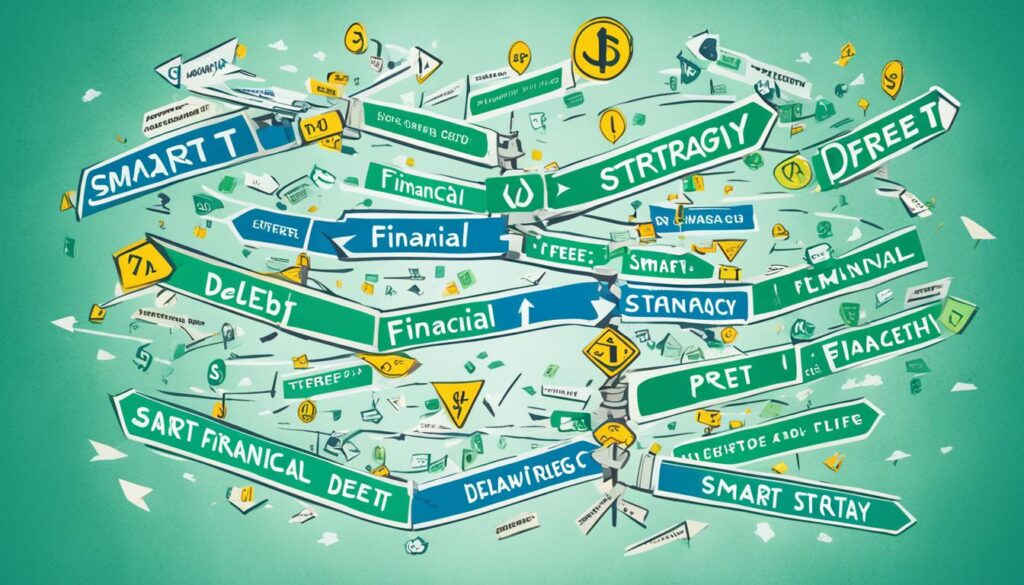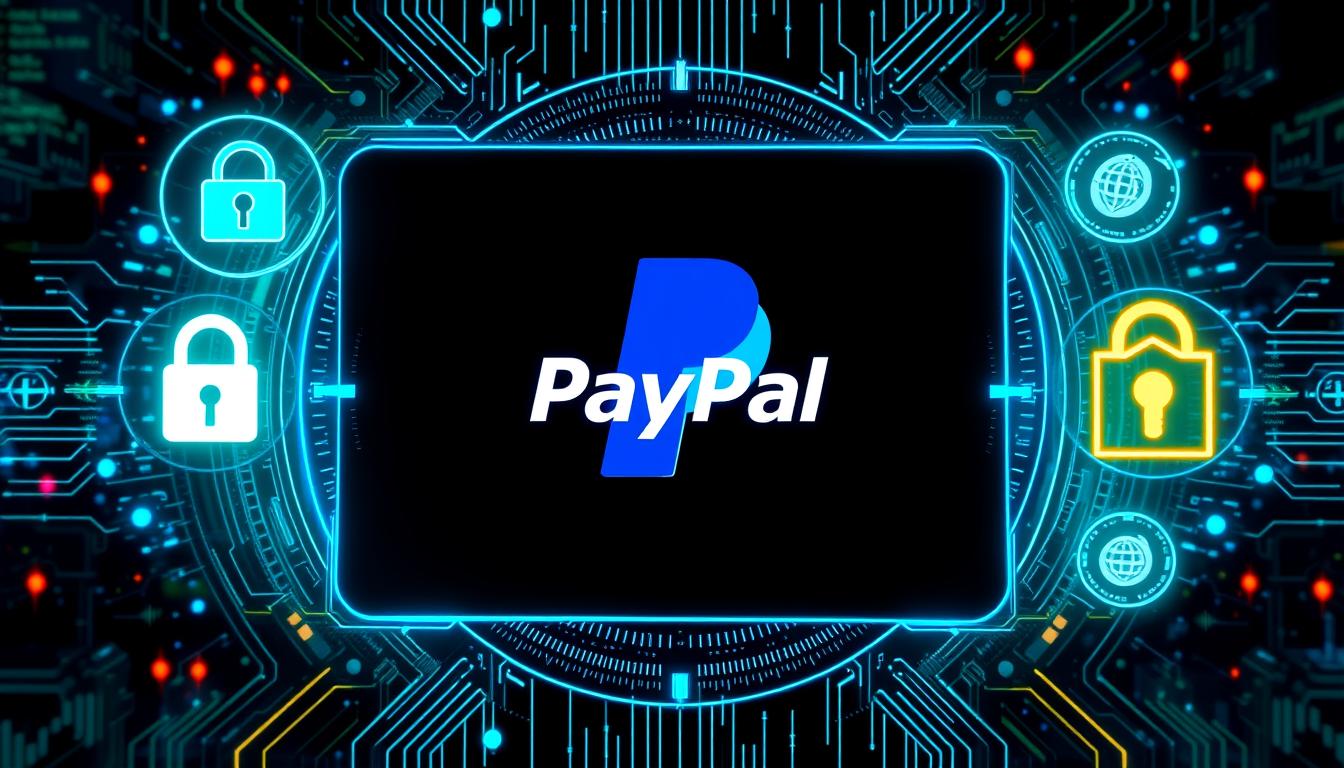Want to be debt-free? It’s crucial to manage debt smartly. In this piece, let’s explore effective financial strategies. We draw on advice from top bodies like the National Foundation for Credit Counseling and the Consumer Financial Protection Bureau. We’ll look at understanding different debts and ways to repair credit. With proper guidance, you can reduce your debt and improve your financial habits.
Key Takeaways
- Understanding the various types of debt is crucial for effective management.
- Budgeting techniques can help control spending and prioritize debt payments.
- Debt consolidation can simplify payments and potentially lower interest rates.
- Credit counseling services offer valuable support and resources.
- Negotiating interest rates can save you money in the long run.
- Staying committed to a payment plan is essential for success.
- Monitoring your credit report can help identify issues and improve your score.
Understanding Your Debt
It’s crucial to know about your debt for managing your finances well. Learning about different debts helps you make smart choices on paying them back. This knowledge lets you take charge of your money and reach your financial goals.
Types of Debt to Be Aware Of
Individuals might come across various debts:
- Secured debt: Loans like mortgages for homes or auto loans for cars are backed by collateral.
- Unsecured debt: Credit card debt is a common form, not secured by assets.
- Revolving debt: Credit cards are typical, letting you borrow repeatedly up to a set limit.
- Installment debt: This includes loans paid back in fixed amounts over time, like personal or student loans.
Assessing Your Total Debt
Start by listing all your debts to see the full picture. It’s crucial to note each debt’s balance, interest rate, and monthly payments. Calculating your debt-to-income ratio is a good step to gauge your financial health in relation to your income.
| Type of Debt | Examples | Characteristics |
|---|---|---|
| Secured Debt | Mortgages, Auto Loans | Backed by collateral, lower interest rates |
| Unsecured Debt | Credit Card Debt | Not backed by assets, higher interest rates |
| Revolving Debt | Credit Cards | Flexible borrowing, allows repeated use |
| Installment Debt | Personal Loans, Student Loans | Fixed payments, set repayment periods |
Knowing the kinds of debt and keeping track of them helps you manage and lessen what you owe effectively.
The Importance of Budgeting Techniques
Effective budgeting techniques are key for financial stability and managing debt. A detailed monthly budget lets people map their income and expenses. This helps them see their spending habits clearly. They can then tell which expenses are essential and which can be cut down. This step is vital for a plan that meets financial goals.
Creating a Monthly Budget
Creating a monthly budget starts with listing income sources. Then, people need to sort expenses into fixed and variable categories. Fixed costs cover rent and utilities. Meanwhile, variable costs could include dining out or entertainment. Sorting expenses helps find where to save money. It also helps better distribute funds across different needs.
Tracking Your Expenses
Keeping an eye on expenses is crucial for sticking to a budget. By monitoring spending regularly, one can stay within budget limits. Budgeting apps like Mint or You Need a Budget (YNAB) make it easier. These tools offer insights into where money is spent each month. This enables smarter financial choices going forward.
Effective Debt Consolidation Strategies
Understanding what debt consolidation means is key for anyone juggling multiple debts. This method combines all debts into one loan. It often brings lower interest rates. By doing this, you can make one payment instead of many. This could also lower your total payment amount. But, choosing to consolidate requires looking at both the good and not-so-good sides carefully.
What is Debt Consolidation?
Debt consolidation merges several debts into a single loan. This can be done by getting a personal loan, using balance transfer cards, or through home equity loans. It gives the advantage of a lower interest rate and one monthly payment. This makes it easier to handle your money. It also helps in managing what you owe and could free up cash.
Advantages and Disadvantages of Consolidation
When looking at debt consolidation, consider its ups and downs:
- Advantages:
- Lower monthly payments because of reduced interest rates.
- Managing payments becomes simpler, reducing stress.
- Consistent payments can help improve credit scores over time.
- Disadvantages:
- Paying over a longer period may mean more interest cost.
- There’s a risk of getting into more debt if spending isn’t controlled.
- Some consolidation methods might ask for collateral, like your home.
It’s critical for readers thinking about consolidation to evaluate their options. Knowing potential savings and requirements helps in making a smart choice.
Credit Counseling Services: What You Need to Know
Credit counseling services are important for managing debt and learning about finance. They offer help and advice to face financial issues. It’s key to choose good counselors who know how to meet your specific needs.
Finding Reputable Credit Counselors
Look for non-profit and accredited counselors. Use reliable sources like the National Foundation for Credit Counseling or the Better Business Bureau to check them out. Make sure they offer:
- Personalized consultations
- Transparent fee structures
- Educational programs on financial management
These features are vital. They ensure you get the right help and can fully trust your counselor.
How Credit Counseling Can Help You
Credit counseling can greatly help anyone in debt. It brings several benefits, including:
- Personalized debt management plans that fit your situation.
- Access to budgeting tools and learning resources to better your financial habits.
- Negotiation assistance with creditors for easier payment terms or lower rates.
This way, you can take charge of your money and work towards a secure financial future.

| Benefits of Credit Counseling | Details |
|---|---|
| Personalized Plans | Plans are customized based on individual circumstances. |
| Financial Education | Workshops and resources that improve financial literacy. |
| Debt Reduction | Strategies aimed at reducing overall debt burden. |
| Support and Accountability | Ongoing support to help clients stay committed. |
Exploring Debt Settlement Options
Debt settlement options offer a way to handle financial challenges by talking to creditors. They aim to lower what you owe, helping if you can’t keep up with payments. But, this can affect your credit score a lot. Many worry about how this might impact their financial wellbeing later on.
Before going this route, know it could have side effects, like tax issues. Sometimes, forgiven debt could count as income you must pay taxes on. Also, your workplace might find out, risking your job and future job chances.
It’s vital to compare debt settlement to other methods. Repayment plans can spread out debt payment, making it manageable. Debt consolidation combines your debts, making a single payment each month easier. Think carefully about what’s best for your financial state.
| Debt Settlement Options | Negotiating Debt | Debt Relief Alternatives |
|---|---|---|
| Quick access to reductions in total debt | Direct discussions with creditors | Repayment plans available |
| Significant credit score impact | Potential future loan complications | Possible lower interest rates |
| Tax implications to consider | Must be organized and patient | Consolidation can simplify budgeting |
Knowing the details of debt settlement lets you choose wisely for your future. It’s key to balance the immediate benefits and potential long-term issues. This helps in making a plan for financial recovery and stability.
Bankruptcy Alternatives for Debt Relief
When debt is overwhelming, it’s crucial to think about when to consider bankruptcy. Bankruptcy holds major effects for your financial future. It’s key to know all your debts, set financial goals, and realize how bankruptcy could lower your credit score.
Evaluating When to Consider Bankruptcy
Deciding on bankruptcy takes a full look at your money situation. You should think about:
- How much debt you have versus your income.
- How long you haven’t been able to pay bills.
- Any changes in money coming in, like losing a job or unexpected bills.
- Your long-term credit and financial aims.
Alternatives to Bankruptcy
Think about other routes before choosing bankruptcy. Some good options are:
- Debt Repayment Plans: Make a deal with the people you owe to pay less every month.
- Credit Counseling: Get help from pros who can talk down your debt with creditors.
- Debt Negotiation: Try to settle debts for less than you owe directly.
- Personal Loans: Use a loan with lower interest to clear existing debts.
- Financial Education Programs: Learn how to manage your money better.
Looking into these alternatives to bankruptcy might help you fix your financial issues. It does this without damaging your credit score for a long time.
Interest Rate Negotiation: How to Lower Your Costs
Negotiating interest rates is a great way for people to reduce borrowing costs. It’s important to prepare well to improve your outcome. Gather all related info early to boost your chances of success.
Preparing for a Negotiation
To get ready for a negotiation, follow several important steps:
- Researching current interest rates helps you know if your rate is too high.
- Reviewing your credit report ensures it’s right. A good credit score gives you more power to negotiate.
- Comparing offers from different lenders lets you see better rates, pushing your lender to offer a good deal.
What to Expect from Your Lender
Knowing what your lender might do helps the negotiation go smoothly. Be ready for:
- Counteroffers that may not be what you hoped for.
- Options like changing your loan term or payment methods.
- A lender willing to talk openly improves future negotiations.
By putting effort into negotiating interest rates, borrowers can lower loan costs. Keeping in touch with lenders opens up opportunities for better deals.
Payment Plan Management Tips
Managing your payment plan well can greatly improve your financial health. It’s important to know how to set up an effective payment schedule. This helps you keep up with your debts. Tackling the debts with the highest interest rates first saves you money. And being organized makes sure you spend every dollar smartly.
Creating an Effective Payment Schedule
Keep these steps in mind when making your payment schedule:
- List all debts: Write down account numbers, how much you owe, and interest rates.
- Prioritize debts: Pay off debts with high interest first. Still, keep up with the minimum payments on other debts.
- Automate payments: Use automatic bank withdrawals to prevent missed payments and late fees.
- Review regularly: Change your plan as your income or expenses change. This helps you stay on track with your financial goals.
Staying Committed to Your Payment Plan
Staying true to your payment plan is key to becoming debt-free. Here are ways to keep committed:
- Set up reminders for when you need to make payments.
- Change your plan if you face money troubles. Your plan needs to be doable.
- Check your budget often. Look for ways to save more money to put towards your debts.
- Seek support from groups or financial advisors. They can keep you motivated and on track.

Understanding Debt Validation Processes
Debt validation is a key tool to protect consumers. It lets people check if a debt is really theirs. Knowing about debt validation helps to spot false claims by creditors.
What is Debt Validation?
Debt validation lets consumers ask for proof of their debt. It’s a way to stop being chased for debts that aren’t yours. Knowing about it puts you in charge of your money matters.
How to Request Debt Validation
To ask for validation, write to the creditor within 30 days of their first contact. Your letter should detail the debt, including account numbers. Doing this stops wrongful harassment and keeps your credit report true.
Credit Repair Methods for a Healthier Credit Score
Improving your financial standing starts with knowing how to fix your credit. It’s important to find problems on your credit report. These issues can really affect your score. Looking over your credit report often helps catch mistakes or old info. Then, taking steps to fix these issues can boost your financial health.
Identifying Issues on Your Credit Report
First, get your credit report from sites like Credit Karma or AnnualCreditReport.com. These sites let you see your credit info for free. Look for things like wrong personal details, accounts you don’t recognize, late payments that were actually on time, or debts that should have been removed.
Finding these issues is key to fixing your credit score.
Steps to Improve Your Credit History
Once you spot the problems, it’s time to act:
- Dispute Errors: Challenge any mistakes you find on your report.
- Pay Off Outstanding Debts: Work on paying down what you owe to lower your credit used.
- Reduce Credit Utilization: Try to keep your credit card balances low compared to your limit.
Sticking to these methods can make a big difference in your credit score. Tools like Casteworld can help guide you through fixing your credit.
Managing Debt Effectively: Summary of Strategies
Managing debt takes both good planning and strong commitment. The tips we’ve covered are key for financial health. A deep understanding of debt management strategies is essential to handle debt well.
Budgeting is crucial for debt management. Making a monthly budget helps people choose what’s most important and put money towards paying off debt. It also involves tracking spending to avoid extra costs.
Getting credit counseling offers insights into personal finance. Experts can give advice to better understand options like debt consolidation or settlement. These can be good ways to lessen debt.
Talking to lenders about lowering interest rates can save money. Knowing how to get ready for these talks can lead to lower repayment amounts. It’s all about approaching lenders confidently to get a better deal.
Understanding the debt validation process is also vital. Knowing how to check if a debt is correct prevents paying what you shouldn’t. This lets you focus on real debts.
Using these methods in daily life can lead to real progress towards financial stability. It brings a sense of calm and control over your finances.
Conclusion
Managing your debt well is key to becoming financially stable and reducing your debt. The ideas in this article help show the way to take control of your money. They guide you from understanding your debt to making wise money moves.
With a focus on making a budget, getting better deal terms, and looking at debt solutions beyond the usual, you can work towards better financial health. Making a strong commitment to these steps, and getting help when needed, sets the base for long-term financial freedom.
Dealing with debt doesn’t mean you’re on your own. There are many resources and tools to help you make smart choices. For example, Wells Fargo offers great advice on managing debt that can help you find financial peace.
FAQ
What are some effective strategies for managing debt?
A few good strategies are making a monthly budget and using debt consolidation. Seeking advice from credit counseling services is also smart. Plus, always check your debts to follow a solid payment plan. Negotiating lower interest rates can also cut costs and help you be debt-free.
How can I understand the types of debt I have?
First, know if your debt is secured, like a house loan, or unsecured, like credit card debt. Then, look at all you owe, including interest rates and monthly payments. This gives a clear view of your financial status.
What is the benefit of using credit counseling services?
Credit counseling offers help with debt management and financial education. They work with you to make a debt management plan. They also provide educational materials and can talk with creditors for you. This helps you take charge of your money again.
Can debt consolidation really lower my interest rates?
Yes, combining multiple debts into one can lower interest rates. It makes payments simpler and may offer better rates. However, it’s vital to weigh pros and cons first.
When should I consider filing for bankruptcy?
Bankruptcy is a last option when you can’t manage your debt. Consider your total debt, financial goals, and its impact on your credit. Look into other options like payment plans or negotiating debts to avoid bankruptcy’s long-term effects.
How can I negotiate lower interest rates on my loans?
Start with understanding current rates, knowing your credit score, and comparing them to the market. Approach your lender with confidence, showing your research. Be prepared for their counteroffers.
What steps should I take to create an effective payment plan?
Begin by paying off high-interest debts while keeping up with others’ minimums. Review and adjust your plan for any financial changes. Consider automatic payments to never miss a deadline.
How can I validate my debts if I suspect errors?
If you doubt a debt’s accuracy, ask the creditor for proof within 30 days of contact. This ensures the debt is right. It protects against wrong collections and credit report errors.
What methods can I use for credit repair?
To fix your credit, spot errors on your report and dispute them. Pay off debts and use less of your available credit. Websites like Credit Karma or AnnualCreditReport.com are useful for checking your credit report and tracking improvements.







